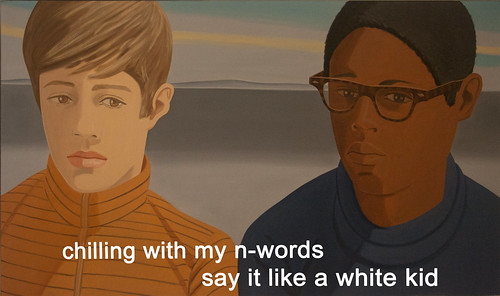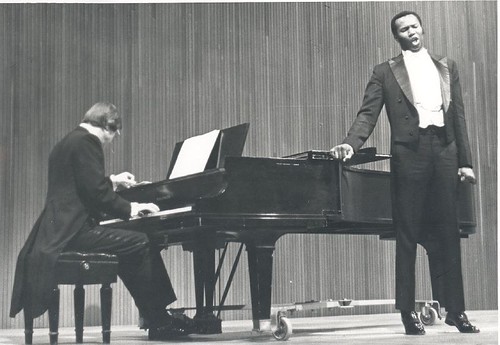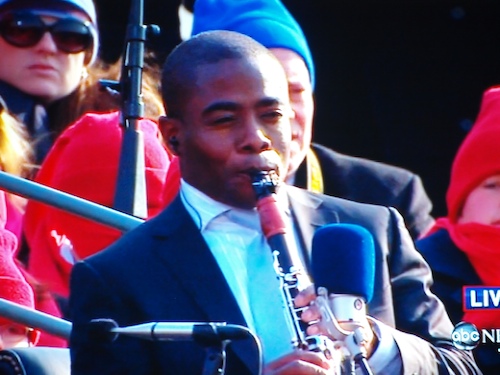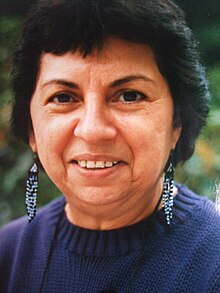 |
| Image credit: Flickr/DJOtaku |
A white coach in suburban Chicago posts a derogatory comment about Whitney Houston's death on Facebook and is suspended for a year. He says he didn't know he was writing that word. He says he only shares Facebook with friends and family, but now everyone knows he wrote it. He says that some of his best friends are black. What did he write that stirred up all this controversy? "I'm so sick of reading about this dumb stupid N----- Whitney Houston."
The parent of a former player saw his comment and spread it around. She wonders if he felt that way about her black son when he played on the team...
-------
A white teacher gets suspended in a Chicago school when he begins a discussion about the N-word in his class. The teacher, Lincoln Brown, says that he intercepted a note that was being passed in class. The note had rap lyrics written on it that used the N-word and he thought it was a "teachable moment"---a great time to talk about the history of that word and how it relates the book Huckleberry Finn. While in the midst of this discussion, his principal did a walk-through and deemed the conversation inappropriate. Lincoln Brown was suspended from teaching, and is now suing the principal for violating his 1st and 5th amendment rights.According to a Sun Times piece, in class Mr. Brown said: “can anyone explain to me why blacks can call each other a n*****, and not get mad, but when whites do it, blacks get angry.” Brown allowed three students to answer the question.
Mr. Brown's students were 6th graders and mostly black. The principal who suspended him is also black.
-------
Both of these stories stirred up a lot of conversation. Comments on each story show that the n-word is still one of the most charged and powerful words in the American English lexicon. An interesting piece by Nick Chiles (a black man) on My Brown Baby argues that Mr. Brown shouldn't suspended because he is opening up a much needed discussion on race. If we don't talk about it, how do we progress towards becoming a multiracial / "post racial" society?
In my mind, the first story is about a stereotypical racist--how do you not know that you typed the n-word in your own Facebook status??? Who uses that word by accident and then follows it up with the cliche excuse "some of my best friends are black?" But the second one...that one really gets me thinking. It makes me think a lot because the question Mr. Brown poses in class about rap music's use of the n-word is one that my own students ask all the time: "Why is it okay for them, but not for us?" I try to explain the idea of "reclaiming a word," the way the feminist movement tries to reclaim the word "bitch" turning it around to make it a positive. But for me, that whole explanation doesn't work...because no matter how many women reclaim the word "bitch", given a certain context it still hurts to hear it applied. The n-word is no different. No matter how many rappers try to reclaim it and make it their own, it still hurts when a white person says it--no matter how well-intentioned that white person may be. I think that's what Mr. Brown needs to realize. No matter what the motivation for his conversation, now matter how well-intentioned he may be, that word hurts.
As a teacher and a believer in the power of empathy, I am always looking for a way to help my students understand things from a different perspective. I have never been able to find a way to explain the pain caused by the n-word. There really is no way to explain to a white person what a degrading word it is...but the closest to a good explanation I've ever seen comes in the form of humor. White comedian Louis CK openly (and hilariously) discusses his skin privilege, and the fact that there is really nothing that anyone can say that hurts him because of that privilege.
Warning--Louis CK uses crude language
How do you feel about these stories? Is it appropriate to discuss the n-word in a classroom? If so, what's the best way to do it? If not, then how should teachers address questions from their students or address situations like the one Mr. Brown encountered with a student passing a note that included the n-word in rap lyrics?












